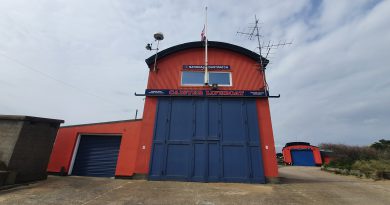Caister-on-Sea – Beauchamp Lifeboat Memorial
This monument, which is located in the East and West Caister Village Cemetery was listed in 2018 and it marks the events of 13 November 1901. This was one of the darkest days for the RNLI in their history, with nine crew members losing their lives when trying to aid a vessel in distress. The Beauchamp lifeboat had been brought into service in 1892, named after the family of one of the main donors, Sir Reginald Proctor Beauchamp. During its period of operation it had been launched 81 times, and after the tragedy it was salvaged and sent to Great Yarmouth for repair. However, the local men said that they didn’t want to use the boat in future, which was agreed and the boat never saw service again. Within five weeks though, a new crew had been formed, a truly brave endeavour.
This memorial was unveiled on Tuesday 30 June 1903 by Colonel Diver, who was then the Mayor of Great Yarmouth. Public subscription had raised over £12,000, a huge sum of money for the time, with the sculpture being designed and executed by J Whitehead & Sons of 74, Rochester Row in Westminster, London. The memorial stands twenty feet high and the base is made from Carrara marble with the top section showing an anchor, a lifebuoy, a boat’s rudder, broken oars and ropes.
The replacement lifeboat had also arrived in Caister a few weeks before, enabling the crew to keep on assisting shipping in the area.
An early image of the monument, although the railings have since been replaced.
And the verse that was sung after the tragedy, a reminder that they ‘Never Turn Back’.
WHAT is this we have done?
Why, our duty, and nothing more—
Our sons will do it again, as their fathers have done before. It is not for the sake of bragging ; we are sailors, one and all— They signalled peril out yonder, and we—we answered the call;
For in face of the storm, in face of the wind, in face of the rising flood, We Caister men never turn back. For why?
It is not in the blood.
Aye, the tempest was raging awful, and the foam flew high on the sands, And the wind and the tide were mocking the weakness of willing hands ;
But we launched the boat for all that (God help the poor children and wives!)
For the noblest duty of man is the salvage of human lives. Then out on the hungry breakers, where the skies were inky black, our boat seemed swallowed by darkness—she went and she never turned back;
And we waited, and watched, and waited all night in the riving foam, Till the dawn broke on orphaned children, and the wreck of the widowed home.
Aye, sir, I am an old man, and in speaking the tears will start;
But them words is the voice of Nature—they spring up straight from the heart— And I says them again, as our Caister men would say with their last breath,
Though the flare on the sands out yonder might light them on to death
For in face of the storm, in face of the wind, in face of the rising flood, Our Caister men never turn back—for why ?
It is not in the blood!
I have fought in a hundred fights when battling with the sea, They are gone, the young and strong ones, but to live in our memory;
Here they sleep by the wind-swept shore to the dirge of the moaning waves, And the Country’s tears are the blossoms let fall on the Caister graves.
They say that the sea is cruel; they may be right or wrong— It is not for us to think—we are bound to be hale and strong. *Aye, sir, I’ve paid my tribute, and I humbly bows my head;
But I keep a good lookout to seaward, for the sake of them that is dead. Aye, I’m proud of our Caister manhood, I’m proud of such acts of love, When I think of the names recorded in the Log Book up above;
And I’m proud of the words you quote, in the name of myself and crew, But not because I spoke them, but because them words is true!
For in face of the storm, in face of the wind, in face of the rising flood, We Caister men never turn back. For why?
It is not in the blood!






